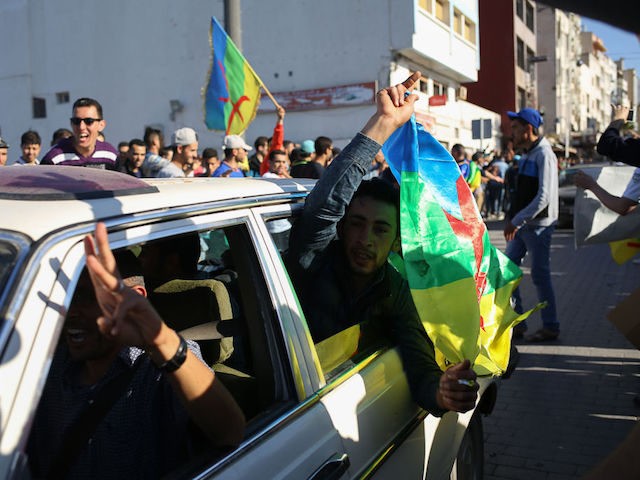This morning’s key headlines from GenerationalDynamics.com
- Arrest of Berber activist in Morocco raises Berber-Arab tensions
- Brief generational history of Berbers and Arabs
Arrest of Berber activist in Morocco raises Berber-Arab tensions (graphic photos)

Fishmonger Mouhcine Fikri (L), and the picture that went viral of his death on October 26 in a garbage truck, triggering widespread anti-government protests
Police on Monday in the town of al-Hoceima in Morocco arrested anti-government activist Nasser Zefzafi, on the charge of having interrupted a prayer ceremony at a mosque in al-Hoceima. The arrest warrant was issued on Friday because he had “obstructed, in the company of a group of individuals, freedom of worship” at the mosque, according to prosecutors, and because he stopped “the preacher from continuing his sermon, giving a provocative speech in which he insulted the imam and fomented disturbances that undermined the calm and sacredness of the place of worship.”
Nasser Zefzafi is the leader of the anti-government Popular Mobilization movement (Al-Hirak al-Shaabi), which he founded last year in November, after the bizarre death on October 26 of a fishmonger who was crushed by a garbage truck.
Mouhcine Fikri, a fishmonger, was illegally selling out-of-season swordfish worth $10,000 that he had just purchased from the port in al-Hoceima. A policeman confiscated his swordfish and threw it into a garbage truck. Fikri jumped into the garbage truck to retrieve his fish, and he was crushed to death by the garbage truck. Some people who were present claim that the policeman told the garbage truck driver to crush him on purpose, though the police deny this.
Pictures of Fikri’s horrific death went viral and triggered regular protests since then. Fikri and Zefzafi are both ethnic Berbers, and al-Hoceima is a mostly Berber port city in northern Morocco, a country governed almost entirely by Arabs.
Zefzafi has been accused of wanting for form an independent Berber country, which he denies: “Our demands are economic and social, there has never been a question of creation of an independent state. For six months we have been resisting… And we will resist until they respond to our demands for the economic and social development of our region.”
More than 20 activists were arrested over the weekend following clashes between protesters and the police. BBC and AFP and Al-Jazeera
Related Articles
- Protests across Morocco after horrific death of fishmonger in garbage truck (02-Nov-2016)
- A look back at Libya in 2011 as the West debates another military intervention (05-Mar-2016)
- Concerns grow about Tunisia’s stability as economic protests escalate (17-Sep-2016)
Brief generational history of Berbers and Arabs
Berbers or Amazighs claim to have lived in northern Africa for thousands of years, since the dawn of civilization, and are referred to as Libyans in classical texts. Although they had wars with the Romans and Byzantines for centuries, they were not subjugated until the arrival of the Arabs starting in the 680s, fifty years after the death of Mohammed. Today there are still isolated tribes descended from the original Berbers, maintaining ancient traditions and the Berber’s Tamazight language, but the population of Berbers has diminished over the centuries, often due simply to intermarriage with the dominant Arabs.
In modern times, Algeria’s war of independence from France (1954-62) united the Berbers and Arabs against the common enemy, the French. However, during the generational Awakening era that followed, tensions grew between the two ethnic groups, culminating a major anti-government protest in Algeria, the Printemps Berbère (the “Berber Spring”) of April 1980. The Berbers demanded an end to discrimination by the Arab majority and recognition Tamazight as a national language. The protests were bloodily suppressed by Algerian security forces.
Since then, there have been occasional new protests, the worst occurring in July 2015, when at least 22 people were killed in ethnic clashes between Berbers and Arabs in Algeria.
Berber anti-government protests have been growing again in Morocco, ever since Berber fishmonger Mouhcine Fikri was crushed to death by a garbage truck after a confrontation with an Arab policeman. Now the arrest of anti-government activist Nasser Zefzafi is certain to energize new protests, probably as early as the weekend. Ancient.eu and France 24 and Temehu.com (Libya)
Related Articles
- France’s new president Macron commits troops to Mali ‘as long as necessary’ (20-May-2017)
- Bizarre monkey attack triggers tribal war in Jabha in southern Libya (21-Nov-2016)
- International Criminal Court gets conviction for ‘cultural genocide’ in Timbuktu Mali (23-Aug-2016)
- Tuareg rebels declare independent state of Azawad in northern Mali (07-Apr-2012)
- Timbuktu’s ancient history at risk over chaotic Mali rebellion (04-Apr-2012)
KEYS: Generational Dynamics, Morocco, Berbers, Amazighs, Tamazight, Arabs, Algeria, Libya, Mouhcine Fikri, al-Hoceima, Nasser Zefzafi, Popular Mobilisation movement, Al-Hirak al-Shaabi
Permanent web link to this article
Receive daily World View columns by e-mail

COMMENTS
Please let us know if you're having issues with commenting.